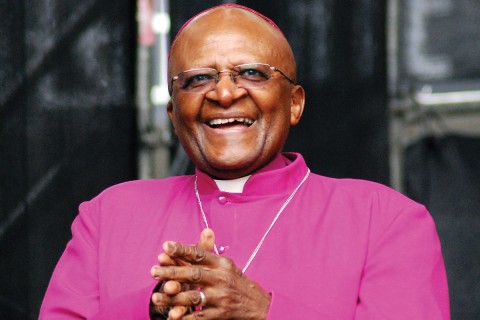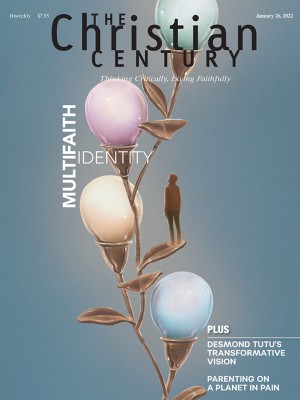Desmond Tutu’s transformative vision
He thrived on the process of endearing himself to all who hope for better days.

Black people raised in apartheid South Africa hitched their survival to some degree of accommodation to White ways. The elite few who became “pioneers” by serving as the first Black person in a given role were surrounded by White colleagues and learned even more about negotiating Whiteness. By age 44, Desmond Mpilo Tutu had already held a few such roles and had spent eight years living in England. He nurtured a growing network of international contacts with the customary ritual of an annual Christmas letter. By his ninth pioneering role 11 years later—as Archbishop of Cape Town—he was an expert in navigating White supremacy.
But that’s not the only reason North Americans grew to love him so. It was also because he loved us, too.
Tutu, who died last month (see obituary, p. 21), thrived on the process of endearing himself to all who hope for better days: the oppressed, certainly, but the overprivileged as well, if for different reasons. He even tried to charm those who were most opposed to the changes he passionately longed for. Within South Africa’s socially conservative churches, Tutu’s leadership effectively eroded gender and LGBTQ discrimination earlier than anywhere else on the African continent and many places beyond it. All this while championing the antiapartheid campaign for which he became best known.
Read our latest issue or browse back issues.
Tutu repeatedly summoned the courage to wade into angry crowds of murderous intent, risking his personal safety along with his political capital for the moral gain of rescuing one sinner from the jaws of death. The resulting publicity catapulted his image abroad, where he had the guts to call US president Ronald Reagan “a racist pure and simple” whose policies were “an unmitigated disaster for us Blacks.” Tutu’s 1986 speaking tour to the United States is credited with inspiring a Republican-majority Senate to override Reagan’s second veto of the Comprehensive Anti-Apartheid Act that year.
The globe-trotting archbishop fluidly navigated cultural boundaries like it was his second nature instead of one honed by rare experience. He loved giving witness to his African character and culture, especially among the uninitiated. His tiny physical frame packed high-pitched laughter dispensed liberally to charming effect. His political pronouncements sprang from both his keen intellect and his religious faith. His breadth of experience birthed an ecumenical vision of all humans as dignified because they are created in God’s image.
The indignities of discrimination—both those he experienced personally and those he witnessed in various leadership roles—seared Tutu’s conscience. He mastered crowds using wide-ranging emotion and reason, often with scriptural references, always salted by wit and peppered with prophetic truths. Frequent elocutionary pauses left listeners breathlessly anticipating his next phrase. He charmed North Americans with flattery and humor before quoting scripture to expose their self-serving privileges that harm others, often by way of an unexpected punchline. I once saw him sting an adoring and well-heeled crowd by declaring the US military budget “obscene.”
I first met Tutu in the late 1970s when he invited me to work for two years in South African institutions of innovative theological education—a field close to his heart in the years following his coverage of Africa for the World Council of Churches Theological Education Fund. He was featured (along with Allan Boesak) in Winds of Change, a 1984 video, which I coproduced, and its study guide, which I authored. In another job, my seniors chose to decline one of his grant proposals and selected me to inform him during our meeting together. I’ve heard him repeat the same jokes at least a dozen times, have borne the brunt of his anger, and once received a stupendously graceful apology when it wasn’t even clear he remembered the details of that over which he wanted to reconcile.
Thoroughly Anglican in the practice of prayerful meditation, Tutu famously maintained a daily schedule of liturgical discipline. He achieved unparalleled prominence—celebrated and controversial alike—within the Anglican Communion. But it was in ecumenical roles that his voice found its broadest reach. Perhaps no other South African has traveled the continent so widely, both in the 1970s for the Theological Education Fund and during the 1980s when he served as president of the All Africa Conference of Churches.
Tutu’s leadership, from 1978 to 1985, of the South African Council of Churches transformed it into a major force for human rights. The world took notice, awarding him the 1984 Nobel Peace Prize. At a time when Black townships were in open revolt, the United Democratic Front, with Tutu as patron, catalyzed unusual discipline within its broad-based coalition of community-based organizations. The UDF included an interfaith spectrum of religious leaders who had hitherto been parochially isolated from one another but now came together out of political desperation, as police violence killed township residents faster than clergy could bury them.
Tutu’s congenial respect for diverse groups served the coalition well, as did his US speaking tour, during which he campaigned for sanctions. But the US media’s insistence on promoting a cult of leadership for every cause sometimes tempted him (and others) to speak for the mass movement before it had been consulted, sometimes before it had even formed the consensus he presumed. He was sometimes criticized for this back home, but South Africans are best qualified to judge that. I’m more concerned about how he was regarded here in the United States.
Tutu retired in 1996 but remained active—and controversial—by leading a truth and reconciliation commission subsequently emulated in other nations. He was a founding member and the first chair of the Elders, a group convened by Nelson Mandela in 2007. He advocated for peace in Northern Ireland and spoke out for justice in Tibet. He wrote of being “ashamed to be an Anglican” after the 1998 Lambeth Conference of bishops reaffirmed its opposition to “homosexual practice.”
After his retirement, Tutu frequently spent large amounts of time in the United States, a nation as attractive to some of his children as it was to him. Here he found expert medical care for bouts with prostate cancer. His seasons of distinguished residence in US universities afforded countless speaking opportunities. Every speech I witnessed began with Tutu thanking Americans for their support of divestment and economic sanction. He was adamant that these had been crucial in hastening a less violent transition to majority rule in South Africa.
But his other calls for divestment have been less heeded. He was deeply concerned about climate change. Bill McKibben has noted that “Tutu, as we began the fossil fuel divestment movement, was our best advocate.”
Tutu spent two months in East Jerusalem in 1966, and he returned to Israel and the Palestinian territories it occupies some years later. Gaza, he said, reminded him “of the oppression that was once our burden in South Africa”; there he “found things that even apartheid South Africa had not done.” He insisted on Israel’s right to exist and carefully delineated between state actions and the Jewish people (who he called “my Hebrew antecedents”). But he decried “the unquestioning support of the USA” for Israel and endorsed the boycott, divestment, and sanctions campaign, fueling yet more controversy.
Here in the United States, did we adore Tutu so enthusiastically because we imagined his primary case to be one far removed from our own perpetuation of White supremacy and colonial exploitation? He liked entertaining us, and we loved being entertained by him, acclaiming him with iconic status of mythic proportions. Yet we praised some of his prophetic warnings while ignoring others—raising the question of whether it is appropriate for disciples to heed their prophets selectively.
Hamba kakuhle, Baba! Go well, Father. You ran your race far and well. Pray for us still, that your fearless imagination may yet infect our courage to act on that to which we are called by those whom we so love to venerate.
A version of this article appears in the print edition under the title “The archbishop’s vision.”





